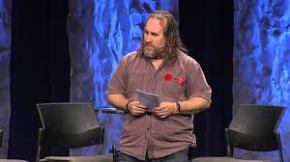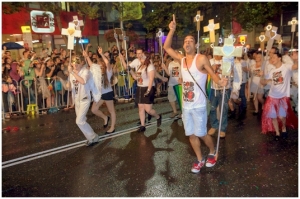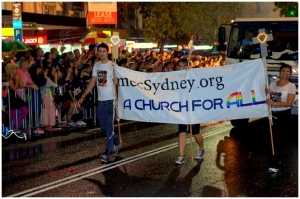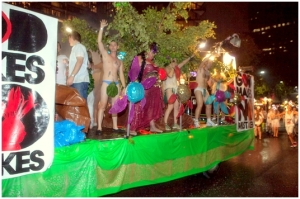I have recently been asked my views on this flyer being distributed in Australia that uses fear of draconian anti-discrimination laws as a reason not to give gay people equal marriage rights.
At first, I was a little surprised by some of the steep fines that have been assessed against people for choosing to discriminate against gay and lesbian people. Surely, people have the right to make choices according to their consciences, or their beliefs?
After all, it was not that long ago that I might have made a decision not to participate in any way in a same-sex wedding, based on my strongly held religious convictions and my own internalized homophobia.
Here I examine this question from three different perspectives: Christian conviction, freedom of religion, and the role of the state in people’s lives.
1. Christian Conviction
Let me first say that religious convictions are exactly that: religious convictions. They have no relevance to state law, and no relevance to Christianity. Jesus came to challenge and question the religious mindset of his day, to teach us how to do that most post-modern of activities, deconstruction. He also declared that the entire law is summed up in love: loving the Lord your God, and loving your neighbour as yourself (Matthew 22). He also commanded that we “judge not,” (Matthew 7) and when asked to judge the woman caught in adultery offered the privilege of casting a stone to the one who was without sin – needless to say, no one took up the offer (John 8).
So, for those of you with strong religious convictions about sinners, it is my view that there is nothing in the teachings of Jesus that gives the obligation or the right to judge and discriminate.
I would not be surprised to find Jesus baking a cake for a gay wedding. After all, he healed the centurion’s servant/lover, he turned water into wine for at a wedding of sinners, he washed the feet of the one who he knew would betray him: Jesus knew who his neighbours were, and some of them were not very nice. Yet he treated them no different to you or me.
2. The role of the state
Now, I don’t intend to say even a fraction of a percent about what could be said about the role of the state in our lives. I’m simply going to state what I believe. The modern state’s main responsibility is the protection of its citizens, which includes ensuring that all citizens are treated equally. Most modern states have a combination of legislative (congress or parliament) and jurisprudence (the legal system) to ensure this happens. States do this without reference or deference to the religious traditions of their people. Rather, they make decisions based on empirical evidence from relevant disciplines, in this case psychology and psychiatry and the study of relationships. And I know of no peer-reviewed research in these fields that supports the idea that same-sex relationships are unhealthy for same-sex attracted people.
When it comes to same-sex marriage, it is clear that without it there is a group of people who do not have the right to marry the person they love. In today’s world, this is clearly discrimination. I will concede that I do have, in one sense, the same rights as straight men: I have the right to marry a woman. And traditionally, where marriage was more about procreation and about ownership of women, this seemed fair enough. Today, however, we think of marriage as about attraction and love and choice. The definition of straight marriage has evolved, and with that evolution it has become clear, with current-day understandings of what marriage is, that there is a group of people who are being discriminated against. That discrimination has a high cost. The most significant cost is the high suicide and depression rates among lesbian and gay and transgender people, who struggle in the face of bullying and prejudice to simply accept themselves, let alone to come out to a world that does not celebrate them as their straight counterparts are celebrated (as Australia’s marriage laws make abundantly clear, civil marriage in Australia is a celebration of heterosexuality, rather than a celebration of love).
By not allowing gay and lesbian and transgender people to marry whom they love, the state is not fulfilling its responsibility to its people. Anti-discrimination laws go a long way towards fulfilling this responsibility, however, and are necessary to make the world a safer place for lesbian, gay, bisexual and transgendered people. Indeed, the world becomes a safer place for people of all diversities.
3. Freedom of religion
This is where it gets sticky for me. I believe in freedom of religion. I think I believe that if you believe that your religion would have you judge others, then you should have the right to do that, insofar as it does not cause harm to others. But that to me is not what Christianity is about. It seems to me that bibliolatry would be a more appropriate name for this religion of judgment.
Anti-discrimination laws that address issues of sex, sexuality, and gender exist to protect individuals from the harm that is caused when lesbian, gay, bisexual and transgender (LGBT) people are discriminated against.
Refusing service to someone who is LGBT adds to the harm that these people have already lived through. It adds to the unfounded beliefs that we are a danger to ourselves and society. It contributes to the ideologies that make parts of the world very unsafe for LGBT persons. It adds to our trauma in a society where most of us have already been bullied and rejected. It fails to show the love of Jesus. It fails the greatest commandment test. It contributes to the scapegoating of the LGBT community by the church, a church which has returned to the futility of the law and abandoned what Jesus taught about love.
I know of no objective reason for anyone to refuse service to anyone. When I worked as a waiter, I waited on anyone who came into the restaurant wanting to eat. When I worked for the Salvation Army, I offered food and financial support to whoever requested it – even if I knew they were drug addicts or alcoholics or a homosexual couple or convicted criminals. It was not my place to judge. It was my place to serve.
On the other hand, I am a shocked by the severity if the fines in some of these cases of refusal of service. I expect that when Australia legalizes same-sex marriage, there will be legislation preventing litigation of people refusing wedding services to gay couples for reasons of religious convictions. I would support such measures, not because I can think of a good reason to do so, but because I was there myself once and I understand that it’s a long journey from homophobia to simply seeing your gay customer as the neighbour Jesus talked about. I know that it’s not easy to look past what you believe is sin, and simply to see a brother or sister needing support as they try to make sense of their life. And I want to respect where you are on that journey.
I would also like to see restorative justice in these legal cases. Rather than a hefty fine, how about spending time getting to know a gay couple, hearing their stories and walking with them, as Jesus did when he encountered sinners?
There will come a time when refusing to bake a cake for a gay wedding will be as offensive as refusing to sell bread to a black person; when objecting to a gay wedding would seem as unreasonable as objecting to a mixed race marriage; when condemning someone for their sexual orientation will seem like condemning me for being left-handed. I believe that day is not too far away.
We don’t need to impose hefty fines on people who cannot accept us. We simply need to keep asking for respect, and keep loving our neighbours, even those who would deny us.








You must be logged in to post a comment.